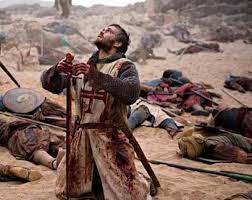 |
| Arn and Cecilia |
Arn the Knight Templar (2010) is a saga about a young nobleman from medieval Sweden who joins the Knights Templar in penance for a sin he did not commit. I saw the film, an abridgment of the much-longer mini-series, both based upon the
Crusades trilogy by Jan Guillou. After a miracle saves his life, Arn is brought up in a Cistercian monastery where he receives a fine education as well as the training to be a knight. After returning to his family, he meets and fall in love with a maiden named Cecilia. Unfortunately, due to the feuding in the kingdom, Cecilia is promised to a member of the powerful Sverker clan. She and Arn meet in secret, pledge themselves to each other, and consummate their love. In itself, such a secret betrothal and consummation would not have been the end of the world in the Middle Ages. However, Arn is falsely accused of having first slept with Cecilia's sister, which makes his union with Cecilia appear to be incestuous. As often happened in the medieval period, religion is used as a political weapon, and Cecilia, pregnant with Arn's child, is imprisoned in a monastery run by Sverker nuns, where she is made to do demeaning forms of penance. Her child is born and taken away from her. In the meantime, Arn is sent to the Holy Land where he joins the Knights Templar. Unflinching in his commitment to his faith and to his lost love, Arn becomes a model knight and a man of honor, who is respected even by his Saracen foes. Both Arn and Cecilia understand that they have been kept apart for political reasons and so have no bitterness in their devotion to God and Our Lady. They pray for each other from afar and thus uphold each other, their hearts still united.
According to
Medievalists:
“The Virgin Mother Never Abandoned Us” ~ Arn Magnusson
The year is 1187, in the Holy Land. We meet Arn Magnusson, a Knight
Templar who makes a chance acquaintance with Saladin one lonely night
out in the desert. The two find each other honourable men and agree not
to raise a hand against one another. A quasi-friendship develops that
lasts throughout the movie and sets the foundation for this tale.
What follows is the story of how Arn (played skillfully by Joakim Nätterqvist, “With Every Heartbeat/Kyss mig” and “Covert Affairs”) ended up in the Holy Land, his upbringing in a monastery, and his sad, and touching love story for a woman back in Sweden.
Arn: The Knight Templar deftly moves back and forth between Arn and his lover, Cecilia (played by Sofia Helin, “The Bridge”),and
the horrible circumstances (due to Cecilia’s vindictive sister) that
force them to be apart. It’s a tasteful love story that doesn’t go heavy
on the cornball factor....
I enjoyed the acting and the movie featured some great supporting
characters like the evil Abbess, Mother Rikissa of the enemy Sverker
clan played expertly by Bibi Anderson (“The Lost Prince”). Other big names in this feature include famed Swedish actor, Stellan Skarsgård (“The Girl with the Dragon Tattoo”, “Avengers”) as friend of the two lovers, Birger Brosa, and renown English actor Simon Callow (“Four Weddings and a Funeral”, “Shakespeare in Love”)
playing Arn’s monk mentor, Father Henry. In the lead role of Arn,
Joakim Nätterqvist does a great job playing the honest and principled
Templar. I really found myself attached to his story and his character
having seen him in a smaller role. I enjoyed watching him take on this
lead and do the film justice without much angst or bravado.
I want to watch the entire television series and read the novels. In the meantime, the movie can be watched online,
HERE.
 |
| Arn learns to fight |
 |
| Mother Rikissa, who cares more about being a Sverker than a Bride of Christ |
 |
| Arn in the Holy Land |
 |
| Arn leading his people to victory |
Share


















1 comment:
If you read the novels, you will find Jan Guillou is a masonic free thinker and basically anticlerical, may have caught up on Medieval society not being as clerical as devout Catholics after Trent, he is usually good at doing research, though for good or ill, for truth or error, biassed in his ideas, that's the kind of journalist he is, but in certain ways at least appears to be a decent guy.
I must admit that my decision on not being his fan base dates from the time when I was still heavily zionist. These days, I think a kind a federative state with the whole territory united but comprising three confessional states with each its deciding body (Jewish Knesset and two Palestinian Parliaments, a Christian and a Moslem one) might be a good idea.
Jan Guillou is of course - as usual - pushing the virtues of Moslem Palestinians, in my experience they have their very lovable sides, when not picking on Christian "fellow Palestinians" and he is politically more or less PLO. I thought Hamas had good ideas, but flawed (what can one expect from non-Christians!), back when Ahmed Yassin was doing the ruling of them, after his death, they suck worse than he did. His successor is basically dreaming of a Muslim world conquest.
So, when you give a criticism of the novel trilogy, not forgetting theological points, I will of course see if I shall reconsider the decision not to read Jan Guillou.
Post a Comment